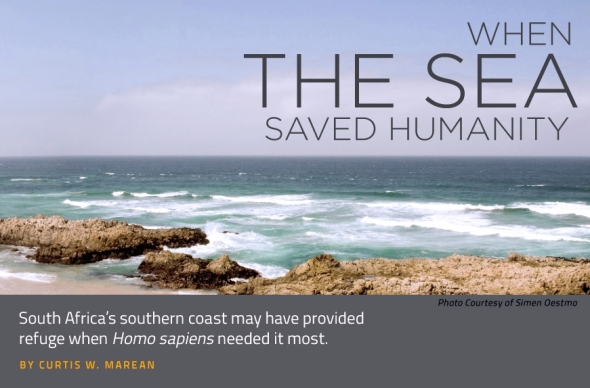Some publications, presentations, and observations of the world around us.
Also available on Research Gate & Google Scholar.
Day 61: #BlueMind Challenge
When the Sea Saved Humanity
Posted on Aug 20th, 2014

by Curtis W. Marean , School of Human Evolution and Social Change at the Institute of Human Origins at Arizona State University
, School of Human Evolution and Social Change at the Institute of Human Origins at Arizona State University
Key Concepts
-
At some point between 195,000 and 123,000 years ago, the population size of Homo sapiens plummeted, thanks to cold, dry climate conditions that left much of our ancestors' African homeland uninhabitable. Everyone alive today is descended from a group of people from a single region who survived this catastrophe.
-
The southern coast of Africa would have been one of the few spots where humans could survive during this climate crisis, because it harbors an abundance of shellfish and edible plants.
-
Excavations of a series of sites in this region have recovered items left behind by what may have been that progenitor population.
-
The discoveries confirm the idea that advanced cognitive abilities evolved earlier than previously thought—and may have played a key role in the survival of the species during tough times.
To post a comment, please login.
View this profile on InstagramDr. Wallace J. Nichols (@wallacejnichols) • Instagram photos and videos
What's New
Rochester Women's Magazine
If You Want To Heal, Find Water
Where did our water come from? One theory is from comets and asteroids nearly 4 billion years... continue
New Trader U
The Science Behind The Ocean's Effect On Our Brain
The ocean has long been a source of fascination and wonder for humans. Its vast expanse, rhythmic waves... continue
Red Bull: Understanding the Blue Mind Theory: How water influences our well-being
Read ahead to learn all about this potential mind-body-water connection.
Red Bull surfer Kai Lenny will take any chance he can get to spend time in the sea. &ldquo... continue
